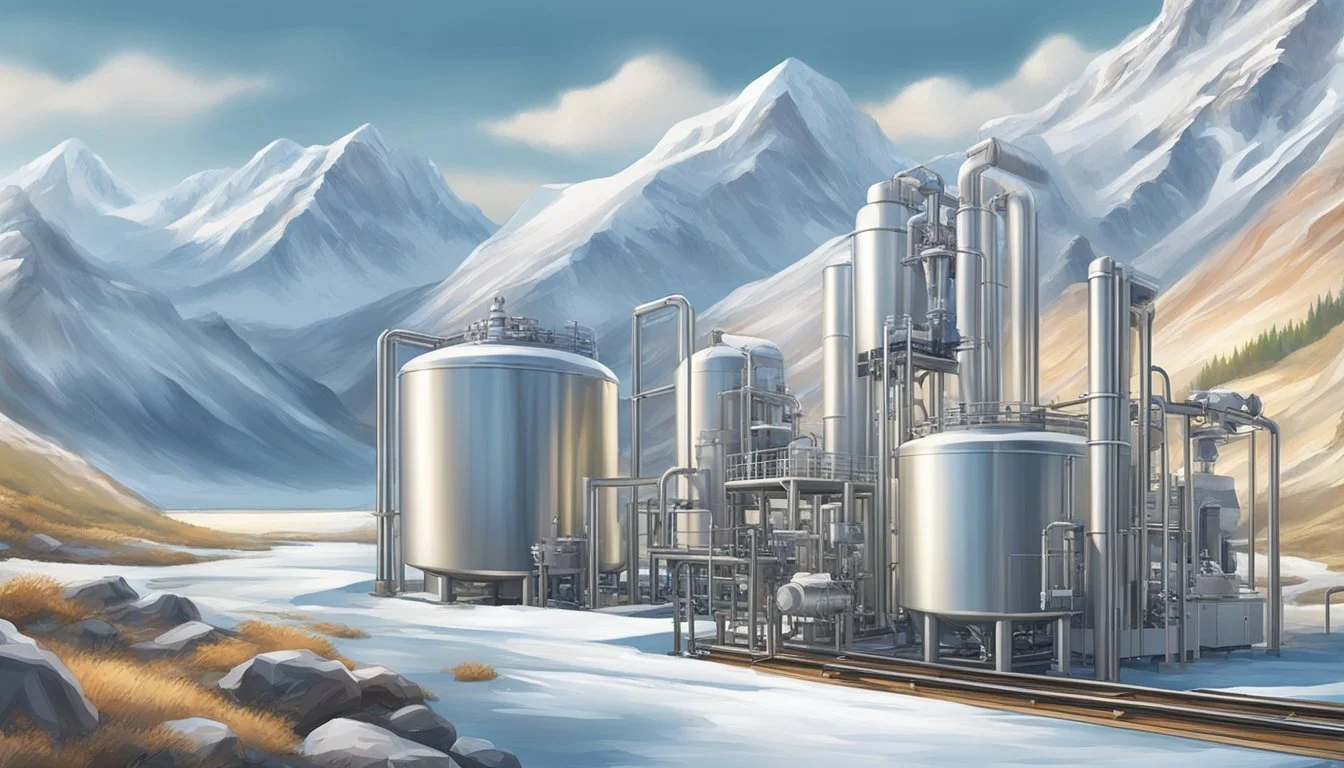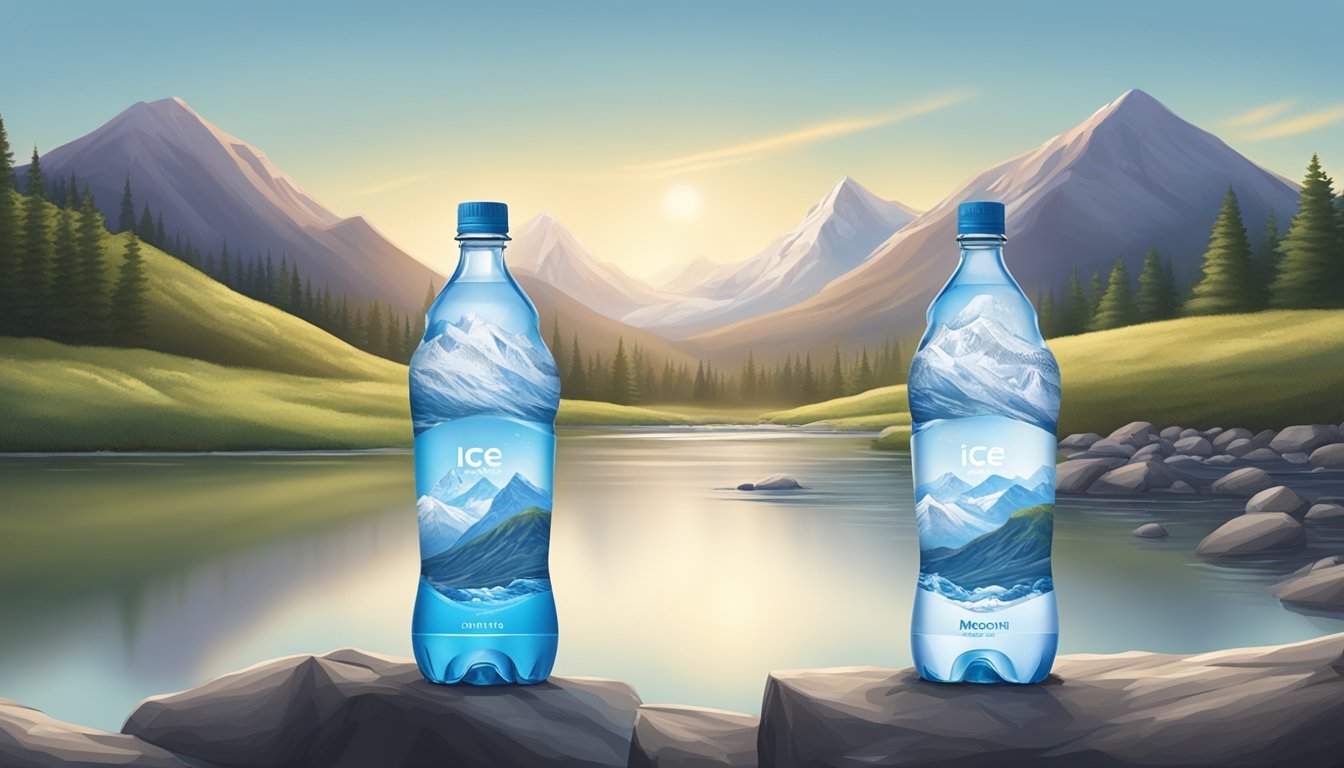Ice Mountain vs. Cirro
Comparing Quality and Taste
When choosing between Ice Mountain and Cirro bottled water, preferences often hinge on taste, sustainability, and packaging. Cirro prides itself on offering a crisp and clean flavor that many find refreshing. Meanwhile, Ice Mountain, sourced from natural springs, tends to be widely available and uses 100% recyclable plastic bottles, appealing to environmentally-conscious consumers.
Sustainability practices might tip the scales for some. Cirro uses eco-friendly packaging, which may resonate with those looking to reduce their carbon footprint. Ice Mountain, on the other hand, emphasizes the local sourcing and community benefits their operations support.
Ultimately, when deciding which bottled water is better, it boils down to what you value more: the crisp taste and eco-conscious packaging of Cirro or the natural spring water and community impact of Ice Mountain. Each brand offers unique benefits that cater to different preferences, making the choice a matter of personal priority.
Understanding Bottled Water
Bottled water comes in various forms and qualities, governed by labeling rules and regulations to ensure safety and transparency. The market for bottled water is diverse, with multiple brands catering to different preferences and needs.
Types of Bottled Water
Bottled water is classified into several types based on its source and treatment process. Spring water is collected from natural springs and often undergoes filtration to remove impurities. Purified water comes from any source but is treated to high standards, often through distillation or reverse osmosis, to remove contaminants.
Mineral water, sourced from mineral springs, contains dissolved minerals that must remain constant without being added artificially. Artesian water is collected from a well tapping a confined aquifer. Each type of water has specific characteristics that affect its taste, mouthfeel, and nutritional content.
Labeling and Regulations
Labeling and regulations for bottled water play a crucial role in consumer protection. In the United States, the FDA oversees the safety of bottled water, ensuring it meets specific standards. Labels must clearly state the source and type of water, as well as disclose any additional treatments or minerals.
The EPA governs tap water, imposing stricter standards as it can contain a wider range of contaminants. The International Bottled Water Association (IBWA) sets industry standards and promotes best practices in safety, quality, and ecological responsibility. Proper labeling helps consumers make informed choices and trust the products they buy.
Bottled Water Market Overview
The bottled water market is vast and competitive, with numerous brands each offering unique selling points. Prominent brands include Ice Mountain, known for its multiple filtration processes, and Cirro, which might offer other distinct advantages. The market is driven by consumer demand for convenience and perceived health benefits.
Sales have been growing steadily, driven by concerns over the safety of municipal water supplies and the desire for a consistent, pleasant-tasting product. Eco-friendly alternatives like boxed water are also emerging, addressing concerns over plastic waste. Despite recyclability efforts, plastic remains a significant challenge in the industry.
Brands continue to innovate, emphasizing purity, flavor, and environmental impact. Understanding these dynamics helps consumers navigate their choices wisely.
Profiling Ice Mountain and Cirro
Ice Mountain and Cirro offer unique characteristics, catering to different consumer preferences through their brand history, range of products, and water sources.
Brand History and Ownership
Ice Mountain is owned by BlueTriton Brands, which took over from Nestlé Waters North America. The brand has been known for its commitment to providing pure, natural spring water since its inception. It sources its water from several springs primarily located in Michigan.
Cirro is a newer entrant in the bottled water market. It positions itself as a premium brand with a focus on sustainability and environmental impact. Owned by a private company with an emphasis on eco-friendly practices, Cirro has gained a reputation for its commitment to reducing plastic waste by using innovative packaging solutions.
Product Range and Varieties
Ice Mountain offers a diverse range of bottled water products. These include:
Natural Spring Water in various sizes
Flavored Water with subtle infusions of fruit essence
Sparkling Water available in multiple flavors
Their product line is designed to meet the needs of different consumers, from individual servings to bulk family packs. They also emphasize the use of recycled plastic in their bottles to promote sustainability.
Cirro, in contrast, focuses on a more refined product range:
Premium Still Water known for its clean and crisp taste
Sparkling Water with a mineral-rich profile
Eco-Friendly Packaging featuring recyclable and biodegradable materials
Cirro aims to attract health-conscious and environmentally-aware consumers by prioritizing quality and sustainability in its offerings.
Source and Origin of Water
Ice Mountain sources its water from natural springs located in the Midwest, particularly within the state of Michigan. The natural spring water is renowned for its purity and is subjected to a rigorous multi-step filtration process to ensure safety and quality.
Cirro sources its water from protected mountain springs. These locations are selected for their pristine conditions and the mineral richness of the water. The brand emphasizes the importance of maintaining the natural balance of its source, committing to sustainable extraction methods that preserve the environment.
Both brands highlight the natural origins of their water, focusing on the purity and mineral content inherent to their sources.
Water Quality and Safety
The water quality and safety of bottled water are crucial factors for consumers. This section examines how Ice Mountain and Cirro ensure their water is pure, safe, and beneficial for consumption.
Purification and Treatment Processes
Both Ice Mountain and Cirro employ rigorous purification and treatment processes to maintain high-quality water. Ice Mountain uses multi-step filtration, including reverse osmosis, to remove impurities. The water is then ozonated for disinfection.
Cirro, on the other hand, sources its water from pristine springs, undergoing carbon filtration and UV treatment to eliminate contaminants. These processes ensure that both brands deliver clean, safe drinking water free from harmful substances like arsenic and pfas chemicals.
Measuring pH and Mineral Content
Understanding the pH and mineral content helps in assessing water quality. Ice Mountain water typically has a pH level between 7.9 to 8.1, indicating a slightly alkaline nature which can be beneficial for some consumers.
Cirro water ranges slightly lower on the pH scale, generally from 7.5 to 7.8. This neutral pH is also desirable for daily consumption. Both waters contain essential minerals such as calcium and magnesium, yet their exact quantities may differ. A balanced mineral content contributes to the water's taste and potential health benefits.
Contaminants and Safety Concerns
Safety from contaminants like lead and arsenic is a top concern. Ice Mountain conducts regular testing to ensure levels of harmful substances are undetectable or within safe limits. Their stringent standards help prevent contamination by pfas chemicals and other pollutants.
Cirro also prioritizes safety by adhering to strict guidelines and frequent quality checks. They ensure that their water is free from significant contaminants, providing peace of mind for consumers. Both brands demonstrate a strong commitment to delivering high-quality, safe drinking water.
Environmental Impacts and Sustainability
Ice Mountain and Cirro bottled waters impact the environment and sustainability in various ways, including their packaging, water source conservation, and overall environmental footprint.
Bottled Water and Environmental Concerns
The production and consumption of bottled water contribute significantly to environmental concerns. Ice Mountain, a brand under Nestlé Waters, often uses plastic bottles.
This reliance on plastic results in increased waste and higher CO2 emissions during production and disposal. Cirro, while lesser-known, faces similar challenges if it uses plastic packaging. Energy consumption and carbon emissions remain critical issues for both brands.
Sustainable Packaging and Practices
Sustainability in packaging is a primary focus for both companies.
Ice Mountain has taken steps towards eco-friendly packaging by introducing bottles made from 100% recycled plastic (rPET). This move reduces the reliance on virgin plastic and supports recycling efforts. The initiative aligns with their 'Made For A Better Tomorrow' campaign, which promotes sustainability.
Cirro's approach to sustainable packaging is yet to be widely recognized. However, adopting similar practices, such as using recycled materials and minimizing plastic content, could significantly improve their environmental footprint. Increased transparency in their sustainable practices would be beneficial.
Water Source Conservation
Water source conservation is crucial for sustainability and environmental health. Ice Mountain sources its water from several Midwest springs. They emphasize natural spring water and have conservation strategies to ensure water sources are responsibly managed.
Efforts typically include regular monitoring and sustainable extraction rates to prevent overuse of local water supplies. Cirro's water source management practices are not as well documented. For consumers prioritizing sustainability, clear communication about water sourcing and conservation methods is essential.
Effective conservation practices help maintain natural water cycles and reduce the impact on local ecosystems.
Health and Hydration Benefits
Ice Mountain and Cirro offer distinct health and hydration benefits to consumers. Both brands cater to hydration needs, while also supporting metabolism and maintaining mineral balance through electrolytes.
Hydration and Metabolism
Ice Mountain provides spring water known for its refreshing taste and draws from natural sources. It employs a multi-step filtration process, ensuring purity that supports effective hydration. Proper hydration is critical for maintaining metabolism, as water facilitates various biochemical reactions essential for energy production and nutrient transport.
Cirro focuses on delivering pure, clean water, often sourced from artesian wells or other protected sources. Like Ice Mountain, Cirro's water aids in hydration, which is crucial for regulating body temperature and supporting metabolic functions. The clean and crisp profile of Cirro water makes it enjoyable and encourages regular consumption, assisting in meeting daily hydration needs.
Electrolytes and Mineral Balance
Ice Mountain doesn't typically emphasize additional electrolytes in its water, but its natural mineral content from spring sources inherently includes trace amounts of essential minerals. These contribute to maintaining the body's electrolyte balance, which is crucial for muscle function, nerve signaling, and overall cellular health.
Cirro may offer variants with added electrolytes to enhance hydration effectiveness, especially for those with higher physical activity levels. The mineral balance in Cirro water supports bodily functions by replenishing minerals lost through sweat and maintaining the optimal electrolyte level, which is vital for preventing dehydration and ensuring efficient body performance.
Taste Profile and Preference
The taste profile of bottled water can significantly influence consumer preference. Factors such as filtration methods, mineral content, and bottling processes play crucial roles in defining the taste.
Factors Influencing Water Taste
Various factors contribute to the taste of bottled water. Filtration methods can remove impurities but also impact the mineral balance. Ice Mountain employs a multi-step filtration process, including screening to remove large particles, which helps maintain a crisp taste. Cirro, conversely, may use different filtration techniques that could alter the natural mineral composition of the water.
Mineral content also defines the taste. Ice Mountain often has a neutral, clean flavor due to its balanced mineral content. In contrast, if Cirro has higher mineral levels, it might have a more robust, distinct flavor. Temperature can further enhance or mute these taste notes, so a cold sip may affected how refreshing the water feels.
Water Sommelier Insights
Water sommeliers, experts in discerning water taste profiles, offer valuable insights. They evaluate waters based on attributes such as mouthfeel, finish, and refreshing quality. Ice Mountain is often described as having a clean, crisp mouthfeel, being light on the palate, and having a refreshing finish.
Cirro may offer a different experience, potentially having a fuller body or distinct mineral notes. According to some reviews, Ice Mountain's flavor may be subtle, making it less impactful but smoother. For those who prefer a more nuanced water with character, Cirro might be the better choice, depending on its specific mineral content and texture.
In both cases, the personal palate plays a crucial role in preference. Some might favor Ice Mountain's subtleness, while others might opt for Cirro's potential complexity.
Consumer Experience and Convenience
Consumers seek convenience in aspects like packaging, portability, and accessibility. Both Ice Mountain and Cirro provide bottled water solutions that aim to meet these expectations effectively.
Packaging and Portability
Ice Mountain uses plastic bottles, which are known for being lightweight and easy to carry. These bottles are designed for single-hand use, making them convenient for on-the-go lifestyles. The bottles come in various sizes, typically ranging from 500ml to 1.5 liters. This variety allows consumers to choose based on their hydration needs.
Cirro, on the other hand, opts for more eco-friendly packaging. They use plant-based bottles that are also lightweight but have a distinctive ergonomic design, ensuring a comfortable grip. While still offering similar size variations, Cirro's packaging emphasizes sustainability without sacrificing portability.
Accessibility and Availability
Ice Mountain has a widespread distribution network across the United States. This makes it readily available in most major retail stores, convenience stores, and supermarkets. Their strong presence ensures that consumers can easily find Ice Mountain water regardless of where they are in the country.
Cirro is accessible, particularly in eco-conscious states where consumers are more inclined towards sustainable products. Although their distribution may not be as extensive as Ice Mountain's, they are frequently found in specialized stores and health food markets. Cirro also provides an option for online purchases, further enhancing their accessibility.
Comparative Analysis
When considering bottled water options, factors such as cost and consumer opinions play significant roles. Delving into the specifics of Ice Mountain and Cirro helps consumers make an informed choice.
Price Comparison and Value
Ice Mountain's pricing typically ranges between $1.25 to $1.50 per bottle, making it a mid-range option. The brand is often seen as providing solid value for its clean taste and reliable quality. Ice Mountain's multi-step filtration process ensures a product free of large particles, enhancing purity.
Cirro, on the other hand, is generally priced slightly higher, around $1.50 to $2.00 per bottle. This higher cost is attributed to its more rigorous filtration methods, including reverse osmosis and advanced mineral addition. Although more expensive, Cirro appeals to consumers who prioritize mineral composition and ultra-purity in their bottled water.
Brand Price Range per Bottle Key Filtration Method Ice Mountain $1.25 - $1.50 Multi-step filtration Cirro $1.50 - $2.00 Reverse osmosis, mineral addition
Market Presence and Consumer Reviews
Ice Mountain has a robust market presence in the United States, especially in the Midwest. It is easily accessible in most grocery stores and convenience shops, contributing to its strong consumer base. Reviews generally highlight its refreshing taste and consistent quality.
Cirro is less ubiquitous but is steadily gaining recognition in premium water markets. Availability may be limited in some areas, but it is often found in high-end grocery stores and through online retailers. Consumer reviews for Cirro are generally positive, focusing on its crisp taste and perceived health benefits due to its mineral content.
Consistent availability and positive consumer feedback make Ice Mountain a dependable choice for many, while Cirro's specialized market appeal attracts those seeking premium water options.
Conclusion
When comparing Ice Mountain and Cirro, several factors must be considered: taste, purity, and filtration processes.
Ice Mountain uses a multi-step filtration system. This thorough process ensures large particles are removed, providing clean, crisp water.
Cirro Bottled Water excels in its proprietary filtration method. Many find it has a natural, smooth taste that stands out.
Smartwater and Dasani are also popular options but differ in taste and filtration techniques. Smartwater utilizes vapor distillation, while Dasani relies on reverse osmosis.
Aquafina and Core Hydration offer alternatives with distinct processing methods and flavor profiles. Aquafina undergoes a stringent purification process, while Core Hydration boasts balanced pH.
Taste is subjective; however, the filtration method and mineral content influence preferences. If filtration and purity are priorities, Ice Mountain and Smartwater are strong contenders. If taste is the main factor, Cirro may have an edge. Choices may vary depending on individual taste and requirements.
More About Ice Mountain
Core Hydration vs Ice Mountain: Which Bottled Water is Better?
Ice Mountain vs Aqua Carpatica: Which Bottled Water is Better?
Ice Mountain vs Cascade Mountain: Which Bottled Water is Better?
Ice Mountain vs Crystal Geyser: Which Bottled Water is Better?
Ice Mountain vs Crystal Lake: Which Bottled Water is Better?
Ice Mountain vs Essence pH10: Which Bottled Water is Better?
Ice Mountain vs Hawaii Volcanic: Which Bottled Water is Better?
Ice Mountain vs Hawaiian Springs: Which Bottled Water is Better?
Ice Mountain vs Icelandic Glacial: Which Bottled Water is Better?
Ice Mountain vs Kirkland Signature: Which Bottled Water is Better?
Ice Mountain vs Liquid Death: Which Bottled Water is Better?
Ice Mountain vs Mountain Valley Spring Water: Which Bottled Water is Better?
Ice Mountain vs Nestle Pure Life: Which Bottled Water is Better?
Ice Mountain vs Poland Spring: Which Bottled Water is Better?
Ice Mountain vs Proud Source: Which Bottled Water is Better?
Ice Mountain vs Purely Sedona: Which Bottled Water is Better?
Ice Mountain vs Richard's Rainwater: Which Bottled Water is Better?
Ice Mountain vs San Pellegrino: Which Bottled Water is Better?
Ice Mountain vs Simple Truth: Which Bottled Water is Better?
Ice Mountain vs Solan de Cabras: Which Bottled Water is Better?
Ice Mountain vs Talking Rain AQA: Which Bottled Water is Better?
Ice Mountain vs Whole Foods 365: Which Bottled Water is Better?
Ice Mountain vs Whole Foods Italian Still Mineral water: Which Bottled Water is Better?







